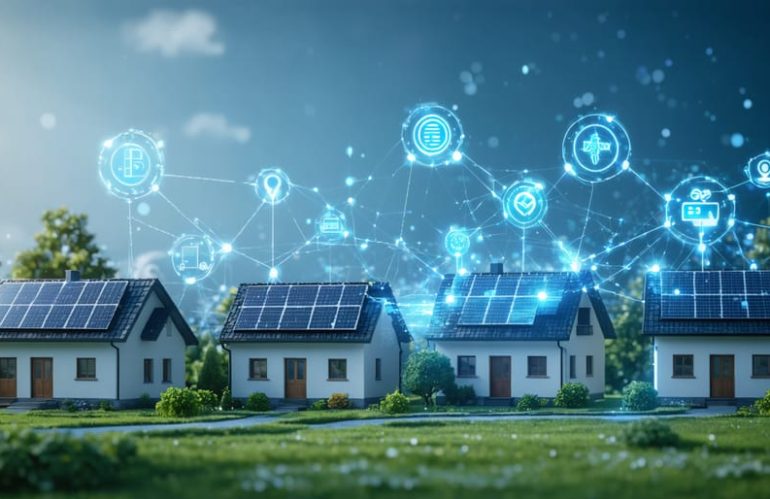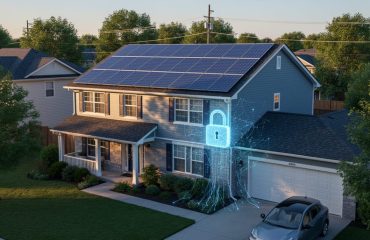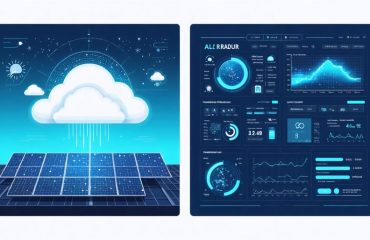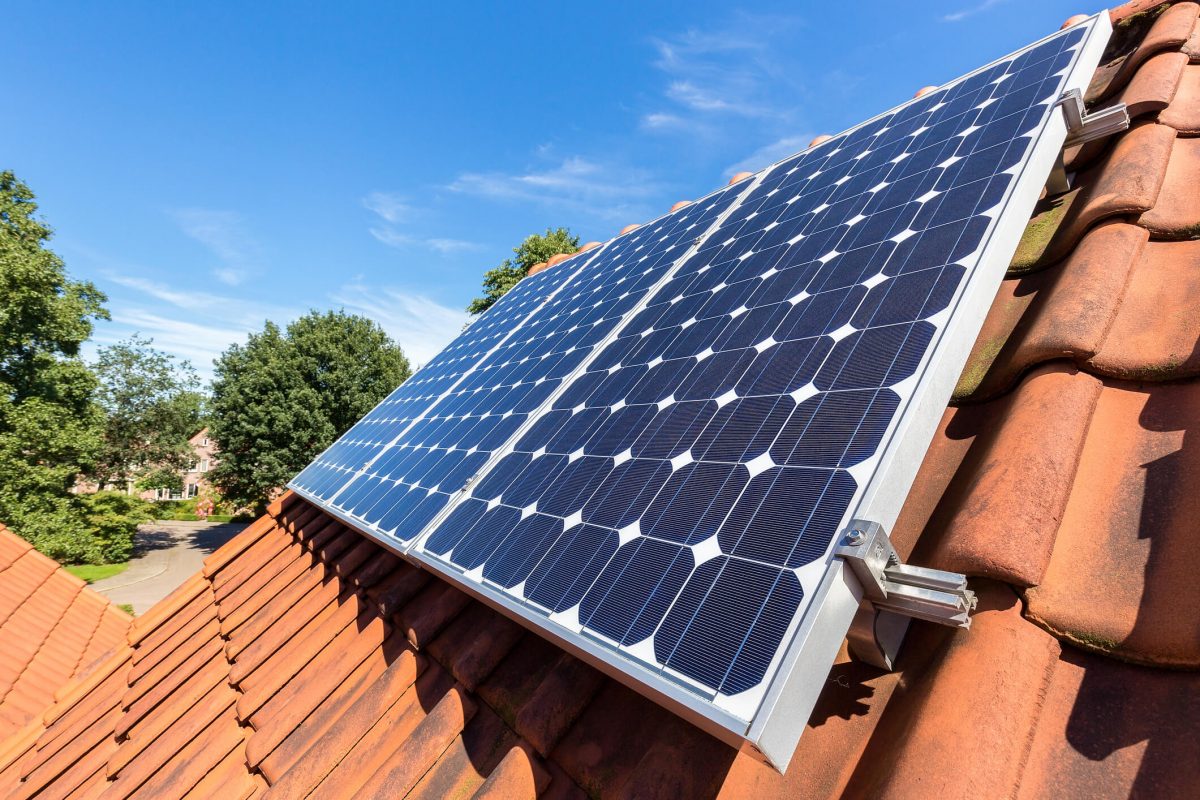Blockchain technology is revolutionizing the renewable energy sector, creating a transparent and efficient marketplace where homeowners can directly trade solar power with their neighbors. By connecting smart meters to decentralized networks, this groundbreaking integration enables automatic, secure transactions that maximize the value of your solar investment. Whether you’re generating excess electricity from rooftop panels or seeking to purchase clean energy at better rates, blockchain platforms now make it possible to participate in a democratic energy economy without intermediaries.
This innovative merger of renewable energy and blockchain technology isn’t just transforming how we buy and sell power—it’s fundamentally reshaping our relationship with energy consumption. Real-time tracking, automated payments, and verifiable green energy certificates ensure every kilowatt-hour is accounted for, while smart contracts eliminate billing complexities and reduce costs. As communities worldwide embrace this technology, homeowners gain unprecedented control over their energy choices while contributing to a more sustainable future.
Why Blockchain Matters for Your Solar Investment
Smart Contracts: Your Solar Power’s Digital Guardian
Smart contracts act like digital agreements that automatically manage your solar energy transactions, eliminating the need for intermediaries and paperwork. Think of them as faithful guardians that spring into action the moment your solar panels generate excess power. When your system produces more electricity than you need, these clever contracts instantly record the surplus and coordinate its sale to neighbors or back to the grid.
The beauty of smart contracts lies in their reliability and transparency. They’re programmed to execute transactions based on predetermined conditions – like selling excess power when prices are highest or buying from the grid when your storage is low. This automation not only saves you time but also ensures you get the best value for your solar investment.
For homeowners, this means hands-free management of your solar power system and instant payments for the energy you share. No more waiting for monthly settlements or dealing with complex billing systems – everything happens automatically and securely in real-time.
Peer-to-Peer Energy Trading: Selling Your Excess Power
Blockchain technology is revolutionizing how homeowners can monetize their solar investment by enabling direct energy trading with neighbors. Through secure, automated transactions, you can sell excess solar power directly to nearby homes without involving traditional utility companies. This peer-to-peer system operates within smart microgrids, creating a local energy marketplace where prices are determined by real-time supply and demand.
The process is straightforward: when your solar panels generate more electricity than you need, the surplus is automatically listed on the blockchain platform. Neighbors can purchase this clean energy at competitive rates, often lower than utility prices. Smart contracts ensure automatic, transparent payments while the blockchain maintains an immutable record of all transactions.
This system not only maximizes your solar investment but also strengthens community energy resilience. By keeping energy local, you reduce transmission losses and support a more sustainable neighborhood power ecosystem.
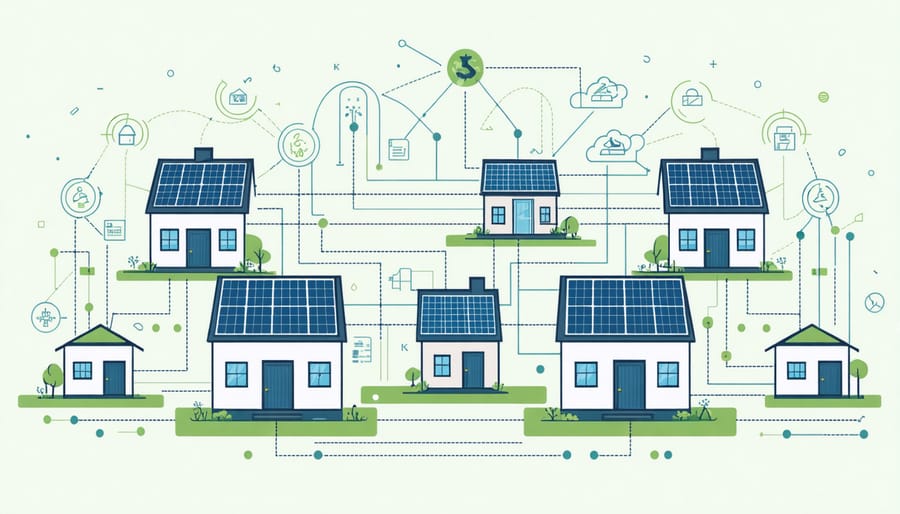
Real Benefits for Solar Homeowners
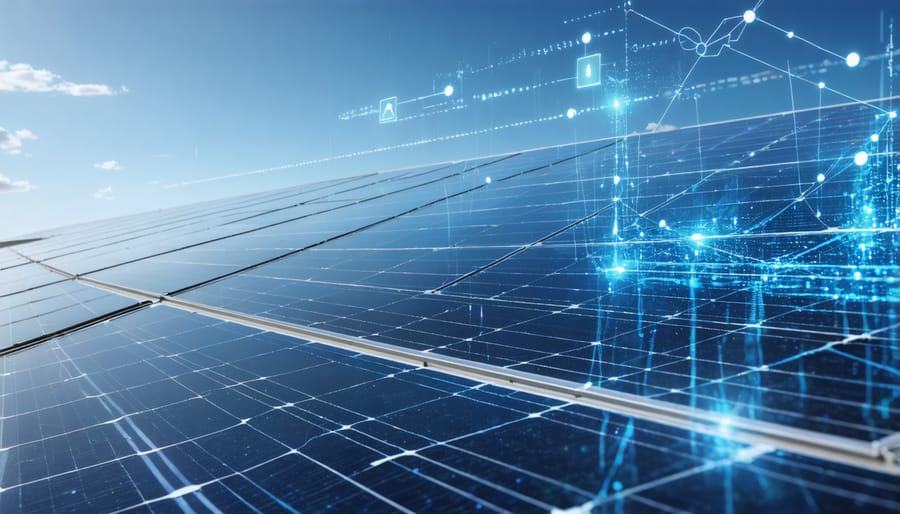
Increased Energy Value
Blockchain technology revolutionizes how homeowners can maximize returns on solar investment through smart contracts and automated energy trading. When your solar panels generate excess electricity, blockchain platforms enable you to sell this surplus directly to neighbors or back to the grid at optimal prices, eliminating middlemen and reducing transaction costs.
The system automatically tracks energy production and consumption in real-time, creating an immutable record of all transactions. This transparency ensures you receive fair compensation for every kilowatt-hour your system produces. Smart contracts automatically execute trades when conditions are most favorable, such as during peak demand periods when energy prices are highest.
Additionally, blockchain technology enables participation in virtual power plants, where multiple solar homeowners can pool their resources to negotiate better rates and increase collective bargaining power. The system’s ability to track and verify renewable energy certificates (RECs) also opens up new revenue streams, as these certificates can be sold to organizations seeking to meet their sustainability goals.
For homeowners, this means higher returns on excess energy production and more control over their energy assets, all while contributing to a more sustainable grid system.
Enhanced Grid Security
Blockchain technology brings an extra layer of security to renewable energy grids, protecting homeowners and energy producers alike from potential cyber threats. Unlike traditional systems, blockchain creates an unalterable record of every energy transaction, making it nearly impossible for hackers to manipulate data or compromise the grid’s integrity.
For homeowners, this means greater peace of mind knowing that their energy production, consumption, and trading data are secure. Each energy transaction is encrypted and verified by multiple network participants, creating a transparent yet protected system that prevents unauthorized access and fraudulent activities.
The decentralized nature of blockchain also eliminates single points of failure that hackers typically target. If one part of the network experiences issues, the rest continues to operate normally, ensuring consistent access to clean energy. This robust security framework also protects smart meters and other connected devices from tampering, safeguarding both your energy assets and financial transactions.
As more homes connect to smart grids, this enhanced security becomes increasingly valuable, protecting your investment while supporting the growth of renewable energy communities.
Getting Started with Blockchain Solar
Required Equipment and Setup
To get started with renewable energy blockchain integration, you’ll need several key components. First, a renewable energy system (such as solar panels) must be installed and operational. Next, you’ll require a smart meter capable of recording energy production and consumption data in real-time. This connects to smart grid technology for seamless data transmission.
Essential equipment includes a blockchain-enabled gateway device, which serves as the interface between your energy system and the blockchain network. You’ll also need reliable internet connectivity and a computer or mobile device to monitor and manage transactions. A digital wallet is required for storing and trading energy credits or tokens.
For enhanced functionality, consider adding a home energy management system (HEMS) that can automatically optimize energy usage and trading based on market conditions. Most components can be installed by certified professionals, typically taking 1-2 days to complete the setup.
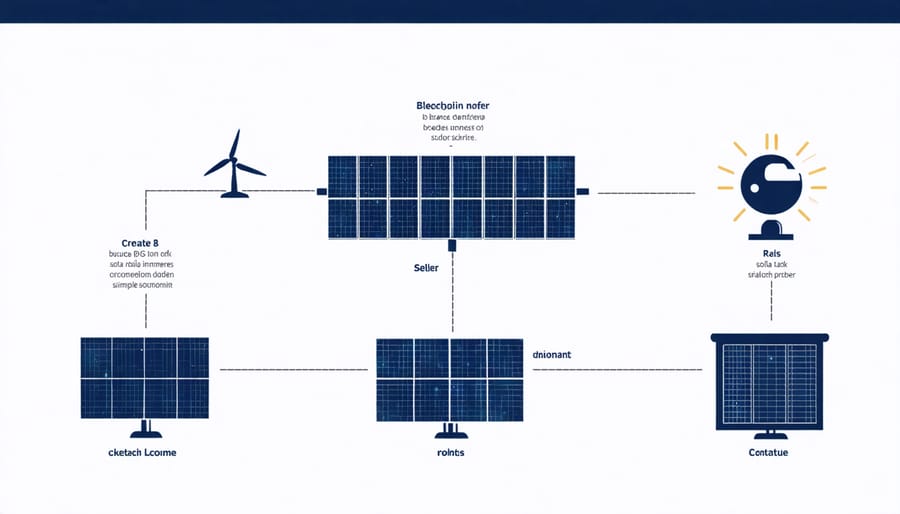
Choosing the Right Platform
When selecting a blockchain platform for your renewable energy needs, focus on three key factors: security, scalability, and ease of use. Popular platforms like Ethereum and Solana offer robust frameworks for energy trading, while specialized platforms such as Energy Web Chain are designed specifically for energy transactions.
For homeowners, look for platforms that offer user-friendly interfaces and mobile apps for monitoring energy production and trades. Ensure the platform has a proven track record of successful energy projects and strong community support. Consider whether the platform supports smart contracts for automated energy trading and if it’s compatible with your existing solar setup.
Cost is another crucial factor – some platforms charge lower transaction fees than others. Also, check if the platform is recognized by local utility companies and complies with regional energy regulations. Many platforms offer free trials or demos, which can help you make an informed decision before committing.
Future-Proofing Your Solar Investment
Investing in solar technology with blockchain integration is like future-proofing your home for the evolving energy landscape. As energy markets become increasingly dynamic, blockchain-enabled solar systems position homeowners to take advantage of emerging opportunities and protect their investment.
The integration of blockchain technology allows your solar system to automatically participate in peer-to-peer energy trading, virtual power plants, and grid services programs as they become available in your area. This means your system can generate additional revenue streams beyond just reducing your electricity bill, potentially shortening your payback period.
Smart contracts embedded in blockchain platforms can automatically adjust to changing utility rates and incentive programs, ensuring you always get the best value for your solar production. As carbon credits and renewable energy certificates become more accessible to homeowners, blockchain provides a verified way to track and trade these valuable assets.
Moreover, blockchain integration makes your solar system compatible with upcoming innovations like electric vehicle charging networks and community solar projects. This adaptability means your investment won’t become obsolete as energy technology evolves. The transparent, immutable nature of blockchain also ensures your solar production data is accurately recorded, which can increase your home’s value and make it more attractive to future buyers who prioritize sustainable living.
By choosing a blockchain-enabled solar system today, you’re essentially future-proofing your home for tomorrow’s energy ecosystem while maximizing the long-term value of your investment.
Renewable energy blockchain technology represents a groundbreaking shift in how we manage and benefit from clean energy. By combining solar power with blockchain, homeowners can now enjoy greater control over their energy production, seamless peer-to-peer trading, and enhanced financial returns on their renewable investments. The transparency and security offered by blockchain systems ensure fair compensation for every kilowatt generated, while smart contracts streamline the entire process. As more communities embrace this innovative solution, we’re moving closer to a decentralized, sustainable energy future. Whether you’re considering solar installation or looking to upgrade your existing system, incorporating blockchain technology can maximize your investment while contributing to a cleaner planet. Take the first step today by exploring blockchain-enabled solar solutions in your area and join the growing community of energy-independent homeowners.

